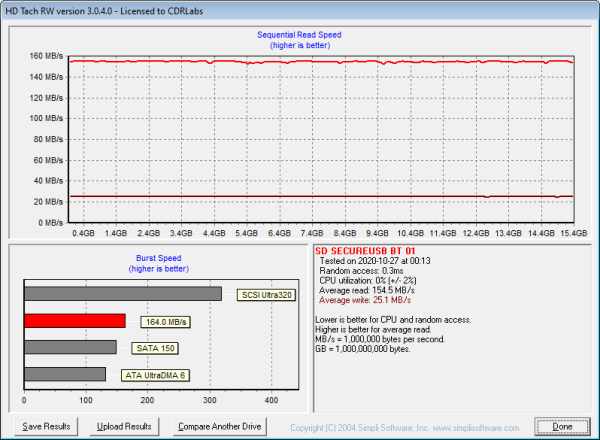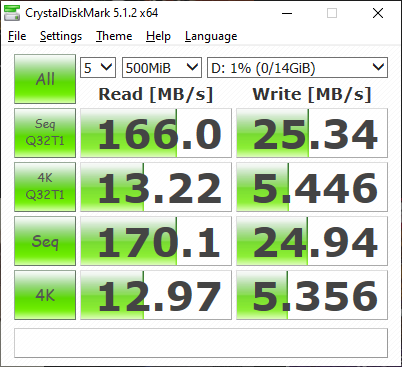The test system used in this review is equipped with an AMD Ryzen 3 3100 CPU, MSI B550 GAMING PLUS motherboard, 16GB (8GB x 2) of Crucial Ballistix 3200 MHz DDR4 memory, Crucial P5 1TB SSD and a GIGABYTE GeForce GTX 1060 WINDFORCE OC 6G graphics card. For the operating system, I used the latest version of Windows 10 Pro.
To test the performance of the SecureUSB BT flash drive, I ran a series of benchmarks using CrystalDiskMark, HD Tach RW and ATTO Disk Benchmark. To get a feel for the "real world" performance, I also copied and pasted 1GB of random files and directories as well as a single 4GB ISO file in Windows Explorer.
CrystalDiskMark 5.1.2:
First, I ran a few quick tests using CrystalDiskMark. This benchmark tool measures the performance of a storage device by testing its sequential read and write speeds as well as its random read and write speeds using blocks 512K and 4K in size.
According to SecureData, the SecureDrive BT is capable of reading at 130 MB/s and writing at 43 MB/s when connected to a USB 3.0 port. While the drive had no problems reaching its rated read speed, it came up short in CrystalDiskMark's sequential write speed test.
HD Tach RW 3.0.4.0:
Next, I used HD Tach to test the SecureUSB BT's read, write and burst speeds as well as its seek times and CPU usage.

The performance here was very similar to what we saw with CrystalDiskMark. When connected to the computer's USB 3.0 port, the drive had average read and write speeds of 154.5 MB/s and 25.1 MB/s, respectively, as well as a burst speed of 164.0 MB/s.
ATTO Disk Benchmark 4.01:
I also used ATTO Disk Benchmark to test the SecureUSB KP's sequential read and write speeds. The tests are run using blocks ranging in size from 512B to 64 MB and the total length set to 256MB.
When tested with ATTO, the SecureUSB BT's read speeds topped out at about 163 MB/s and its write speeds at 24 MB/s.
"Real World" Benchmark:
To test the "real world" performance of the SecureUSB BT, I copied and pasted 1GB worth of randomly generated files and directories. All of the files are between 1KB and 95MB in size and no more than five directories deep. To see how well the drive handled large files, I also copied and pasted a 4GB ISO file.
| 1GB of Files | 4GB ISO File | |
| Write: | 46 seconds | 2:52 |
| Read: | 10 seconds | 26 seconds |
The SecureUSB BT performed fairly well here, taking 46 seconds to write 1GB worth of test data and 10 seconds to read it back.
Final Thoughts:
Like SecureData's other encrypted storage products, the SecureUSB BT is a great choice for the security conscious consumer or professional looking to keep sensitive data out of the wrong hands. Available in a number of different capacities, this USB flash drive features a FIPS compliant design, military grade full disk 256-bit AES hardware encryption and a rugged, extruded aluminum casing that protects it against dust, water and physical damage.
What really makes the SecureUSB BT stand out amongst other encrypted flash drives, though, is that it is unlocked via an app on your mobile device. This is not only easier to configure than a keypad, it offers additional features like two-factor authentication, password recovery and biometric unlock where you can use facial recognition or your fingerprint. Corporate IT departments can also enroll in a subscription that will allow them to remotely manage the SecureUSB BT and control things like where and when a drive can be unlocked.
When it comes to performance, the SecureUSB BT did relatively well in our tests. With all of the encryption being done at the hardware level, I found it to be just as fast as a non-encrypted USB 3.0 flash drive. Thanks to its USB 3.0 interface, the 16GB version of the SecureUSB BT was able to read at speeds as high as 166 MB/s and write at more than 25 MB/s.
The SecureUSB BT is available now in 16GB, 32GB and 64GB capacities and can be purchased directly from SecureData or through some of the sellers listed on Amazon.com. Prices currently range from $106 up to $169.

Highs:
- Secure wireless authentication via mobile device
- App features two factor authentication, password recovery and remote data wipe
- FIPS 140-2 Level 3 validated
- Military-grade AES 256-bit XTS hardware encryption
- Good read and write speeds
- Brute force anti-hacking self destruct feature
- Step-away autolock
- OS and platform independent
- Dust and water resistant
- Remote management ready
- USB 3.0 interface
- 3 year warranty
Lows:
- Slightly larger and heavier than non-encrypted flash drives
- Pricey



